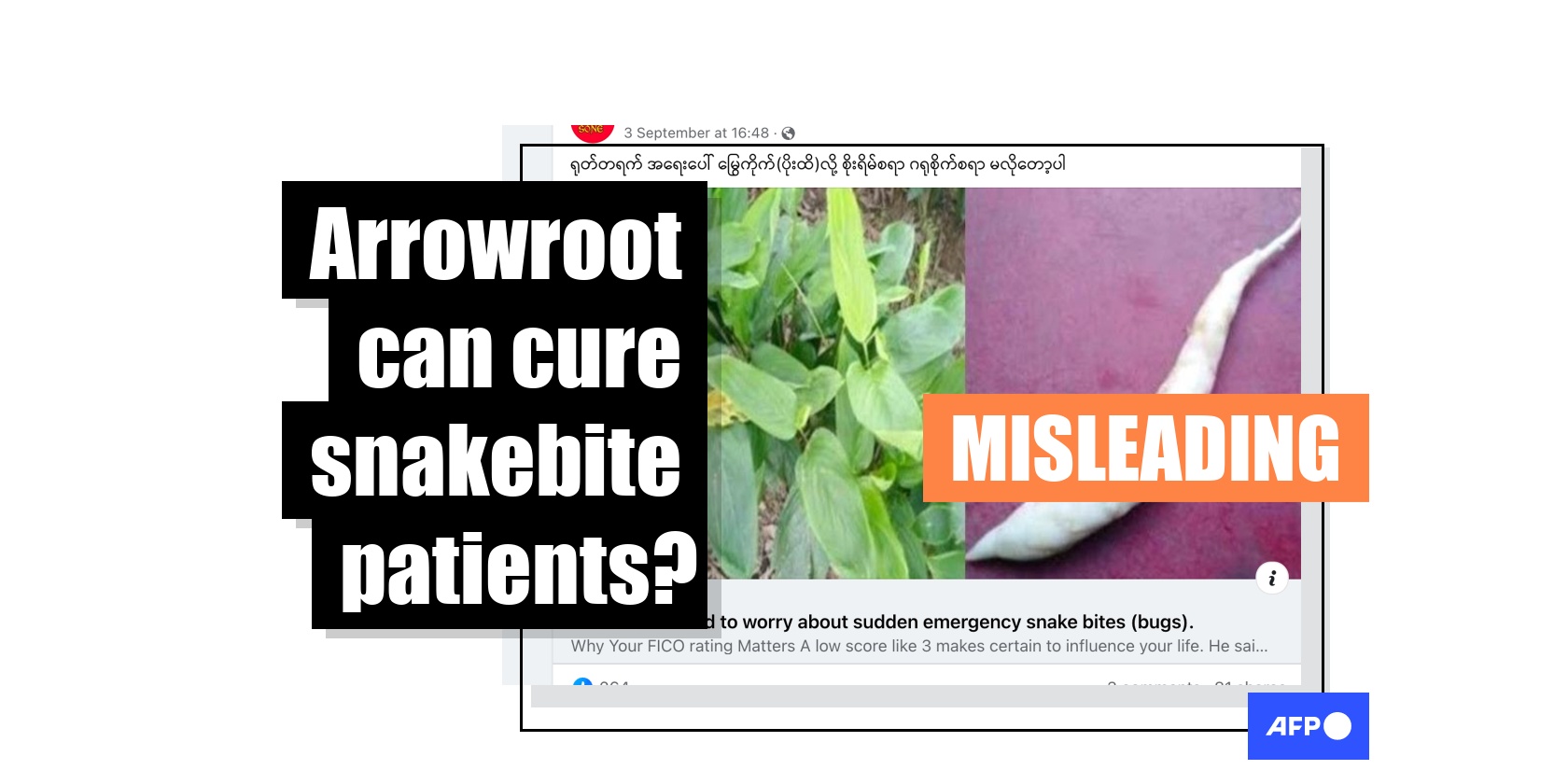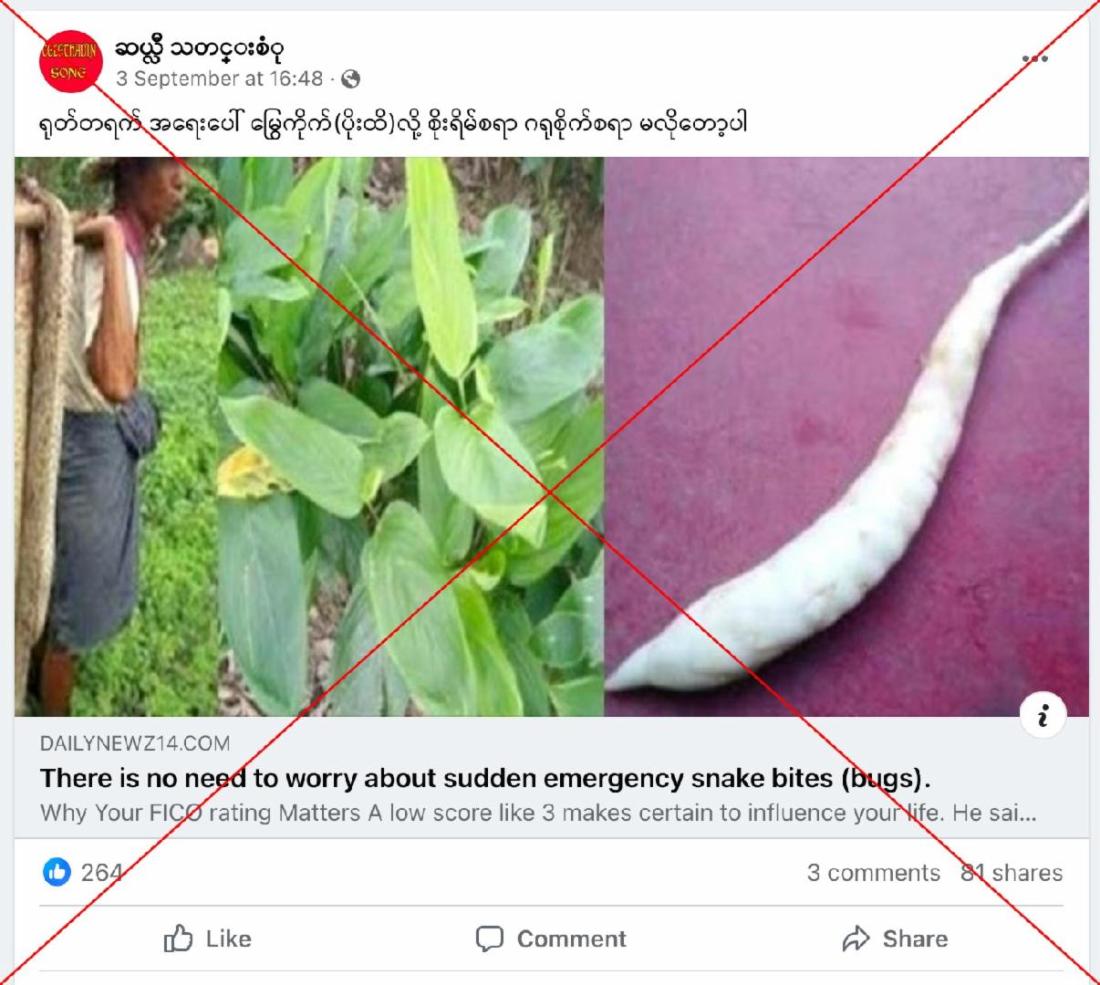
Medical experts say lack of research on arrowroot for treating snakebite patients
- This article is more than two years old.
- Published on September 22, 2023 at 07:50
- 2 min read
- By AFP Thailand
"No need to worry about venomuous snakebites in an emergency situation," reads a Burmese-language Facebook post shared on September 3 on a page with more than 19,000 followers.
The post links to a blog article which tells the story of a traditional healer who cured a man of a snakebite in thirty minutes.
"A traditional medical practitioner found a snakebite patient in a village while he was travelling. He examined the patient and determined that his heart was still functioning," it says in Burmese.
"Consequently, he sought permission from the patient's family to treat him, and they granted it. He then obtained arrowroot roots and pounded them in a mortar. Afterward, he administered the mixture to the patient. Fifteen minutes later, the patient regained consciousness. Thirty minutes later, the patient was able to sit up."
Boiled arrowroot is an edible starch that is a popular snack in Myanmar.

According to a WHO study, Myanmar records about 15,000 snake bites each year, in this number about 1,000 cases result in death (archived link).
Myanmar is home to a number of deadly venomous snakes, including Russell's vipers, King cobras, cobras, kraits, and a number of sea snakes.
Similar claims have been shared here, here, and here on Facebook and here, and here on blogs.
The claim, however, is misleading.
Medical experts have stated that administering the appropriate antivenom is the most effective treatment for snakebites, warning that local remedies can be ineffective and delay proper treatment.
Treatment lacks evidence
Dr. Napat Ratnarathorn a zoologist at Thailand's Mahidol University, said there is no research on arrowroot's effectiveness on treating snakebites.
Despite information that the plant has been and is still being used in many Asian countries to treat snakebites, he told AFP on September 5 that "no research can confirm that arrowroot is effective in treating symptoms caused from snake venom."
Napat, who is an expert on Vertebrate Zoology and Herpetology, explains that alleviating lingering symptoms can mislead people to believe the plant is capable of treating snake venom, which can be dangerous.
"For example, if you have been bitten by a viper. The plant can relieve pain and swelling that is not necessarily due to the snake venom, but it can be used for any cause. It does not reduce the toxicity caused by snake venom."
WHO advice
Dr. Margaret Harris, a spokesperson for WHO, told AFP on August 31 that the administration of antivenom as soon as possible after a bite is the best response (archived link).
"Antivenom is is most effective when administered as soon as possible following a bite, as many of the effects of snake venom are irreversible, including venom with neurotoxic, cytotoxic, haemorrhagic and haemotoxic effects."
Professor Nicholas Casewell, director of the Centre for Snakebite Research and Interventions at the Liverpool School of Tropical Medicine, supported the WHO's suggestions (archived link).
Casewell warned not to delay seeking medical treatment for snakebites.
"As outlined in the WHO guidelines, the only recognized effective treatments are antivenoms," he told AFP on September 1.
"There is a risk that the use of untested and likely ineffective local remedies could delay patients from seeking anti-venom treatment, which could lead to worse outcomes."
Copyright © AFP 2017-2026. Any commercial use of this content requires a subscription. Click here to find out more.
Is there content that you would like AFP to fact-check? Get in touch.
Contact us
